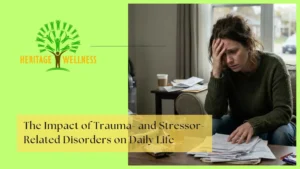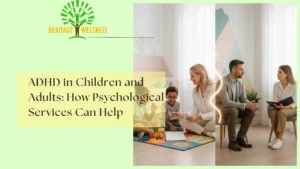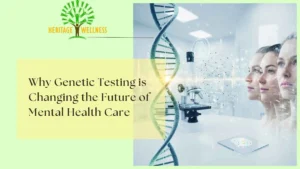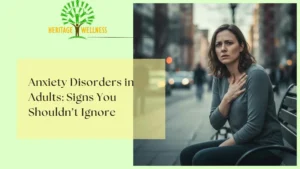Attention-Deficit/Hyperactivity Disorder (ADHD) is often misunderstood as simply a childhood condition marked by distractibility or impulsiveness. In reality, ADHD is a complex neurodevelopmental disorder that affects both children and adults. More importantly, ADHD often coexists with other mental health challenges such as anxiety, depression, and emotional dysregulation. Understanding this link is crucial for effective treatment and long-term well-being.
In this blog, we’ll explore the connection between ADHD and mental health, common comorbidities, and how individuals and families can seek the right support to manage symptoms and lead fulfilling lives.

What Is ADHD?
ADHD is a neurological condition that affects attention, self-regulation, impulse control, and executive function. It typically begins in childhood and may persist into adolescence and adulthood. There are three main types of ADHD:
- Predominantly Inattentive Type (trouble focusing, forgetfulness)
- Predominantly Hyperactive-Impulsive Type (excessive movement, impulsivity)
- Combined Type (a mix of both inattentive and hyperactive symptoms)
While it’s often diagnosed in childhood, many adults live with undiagnosed ADHD, unaware that it’s affecting their work, relationships, and mental health.
The Overlap Between ADHD and Mental Health Disorders
ADHD rarely exists in isolation. According to mental health professionals, over 60% of individuals with ADHD also have at least one coexisting condition. Some of the most common include:
1. Anxiety Disorders
People with ADHD often struggle with chronic worry, social anxiety, and panic attacks. Difficulty managing tasks and unpredictable behavior can lead to increased stress, which in turn contributes to anxiety.
2. Depression
Feelings of failure, constant overwhelm, and social rejection may lead to low self-esteem and hopelessness. Over time, untreated ADHD can contribute to the development of major depressive disorder.
3. Mood Disorders
Bipolar disorder and emotional dysregulation are more common in those with ADHD. Although these conditions differ, they can overlap in symptoms, making diagnosis and treatment complex.
4. Substance Use Disorders
Individuals with ADHD may turn to alcohol, nicotine, or drugs as a way to self-medicate or manage impulsivity. This increases the risk of addiction and complicates mental health further.
5. Sleep Disorders
Insomnia, restless leg syndrome, and sleep apnea frequently affect people with ADHD, exacerbating mental health symptoms like fatigue, irritability, and mood instability.
How ADHD Affects Mental Health
ADHD impacts nearly every aspect of life, from school and work to relationships and daily tasks. Here’s how unmanaged ADHD can lead to poor mental health outcomes:
- Academic and Occupational Struggles: Chronic underachievement, missed deadlines, and difficulty concentrating can affect self-worth.
- Interpersonal Conflicts: Miscommunications and impulsive behaviors can strain relationships with family, friends, and coworkers.
- Emotional Exhaustion: The mental effort required to “hold it together” can lead to emotional burnout and breakdowns.
- Social Isolation: People with ADHD may avoid social situations due to fear of rejection or judgment, worsening anxiety, and depression.
Recognizing these challenges is the first step toward seeking effective treatment and improving overall mental wellness.
Why Proper Diagnosis Matters
Because symptoms of ADHD often mimic or mask those of other mental health conditions, many people are misdiagnosed or receive partial treatment. For example, someone diagnosed only with depression may receive antidepressants, which do little to address the underlying ADHD symptoms fueling the depression.
A proper diagnosis from a licensed mental health professional or psychiatrist is critical. Comprehensive evaluations typically involve:
- Clinical interviews
- Behavioral assessments
- Medical history review
- Input from family, teachers, or employers
Only with a full picture can a treatment plan be designed that targets both ADHD and co-occurring mental health concerns.
How to Find the Right Support
Treatment for ADHD and mental health conditions is most effective when it’s multidisciplinary, combining medication, therapy, lifestyle changes, and support networks. Here’s where to start:
1. Medication
Stimulant medications like Adderall or non-stimulants like Strattera can help manage core symptoms of ADHD. For those with anxiety or depression, antidepressants or mood stabilizers may also be prescribed. Always consult a healthcare provider before starting any medication.
2. Therapy and Counseling
- Cognitive Behavioral Therapy (CBT) helps individuals reframe negative thoughts, develop coping strategies, and improve emotional regulation.
- Coaching or ADHD-specific therapy can support goal setting, time management, and organizational skills.
- Family therapy is also beneficial to improve communication and reduce conflict at home.
3. Support Groups
Connecting with others who have ADHD can reduce feelings of isolation and provide practical advice. Online forums, local meetups, and virtual support groups offer community and encouragement.
4. Educational Resources
Learning more about ADHD and its impact on mental health helps individuals and families advocate for themselves in school or work environments. Websites like CHADD (Children and Adults with Attention-Deficit/Hyperactivity Disorder) offer excellent information and toolkits.
5. Healthy Lifestyle Choices
- Regular exercise improves mood and reduces impulsivity.
- Sleep hygiene helps stabilize emotions and concentration.
- Mindfulness and meditation reduce anxiety and increase awareness.
- Nutrition plays a role in brain function and overall energy levels.
Even small changes can make a significant difference in managing symptoms.
When to Seek Professional Help
If you or someone you care about is experiencing persistent emotional distress, poor functioning, or suicidal thoughts, don’t wait. Seek immediate help from a mental health professional. Early intervention improves outcomes and can prevent more serious complications down the road.
Final Thoughts
ADHD and mental health are deeply interconnected. When left untreated, ADHD can lead to a cycle of emotional, academic, and social challenges that compound over time. The good news is that support is available, and with the right tools and treatment, people with ADHD can thrive in every aspect of life.
By recognizing the signs, seeking proper diagnosis, and building a support system, individuals can manage both ADHD and its mental health impact more effectively. Whether you’re navigating this path yourself or supporting a loved one, remember: you are not alone, and help is always available.






